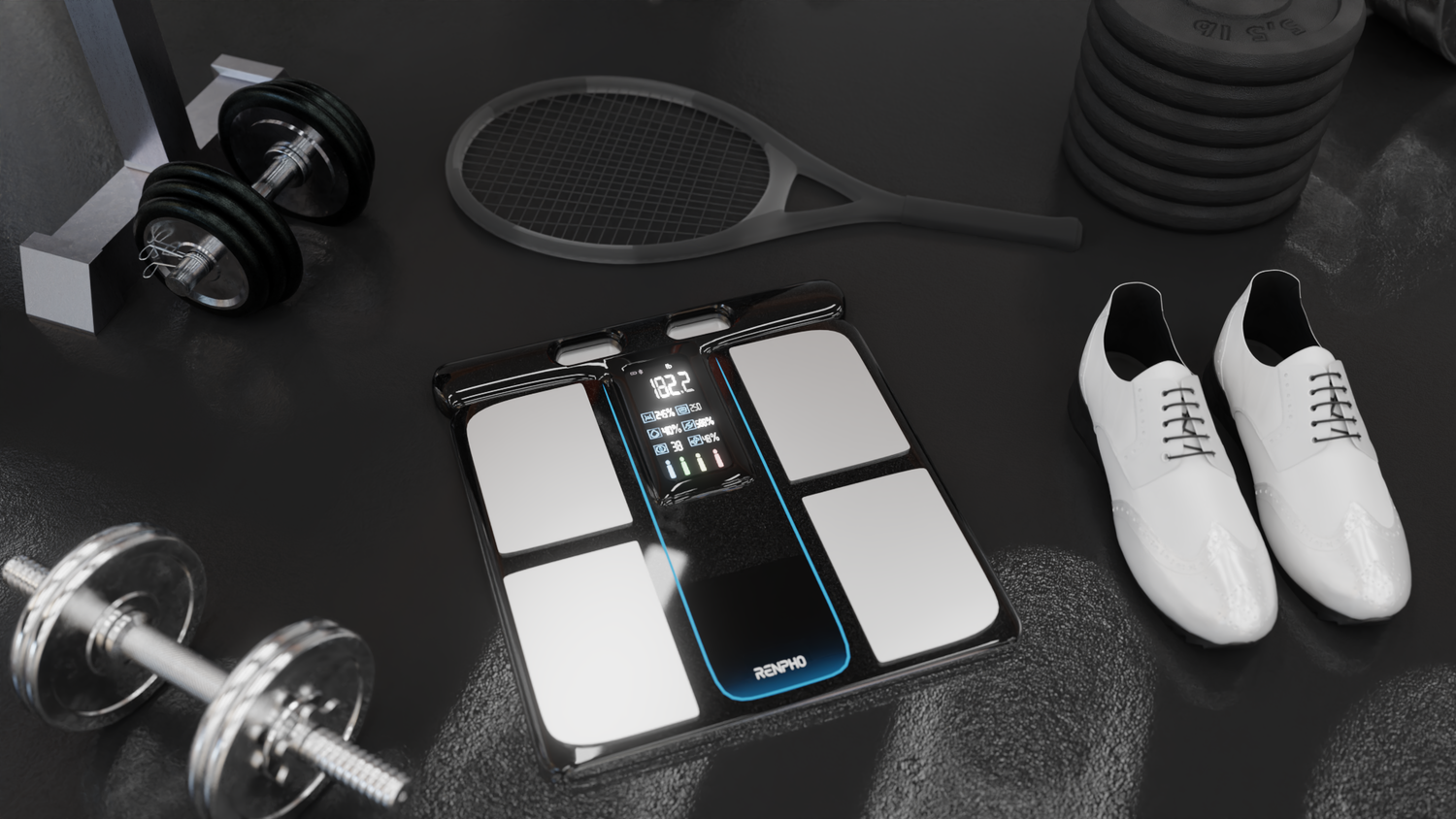Your regular scale can only tell you so much. While weight is a useful metric, more is needed to provide the full picture of your body composition and overall health. If you're serious about improving your fitness, you need to look beyond the number on the scale and gain deeper insights into your body fat levels.
Fortunately, there are a variety of smart fitness tools available today that can give you a much more detailed understanding of your body fat percentage, muscle mass, and other important health indicators. These technologies are making it easier than ever to take a more holistic approach to weight management and fitness.
So, let’s see how you can use these innovative smart fitness tools to go beyond the basic scale and uncover valuable data about your body fat levels. With this knowledge, you'll be empowered to make more informed decisions about your health and fitness goals, whether that means losing weight, gaining muscle, or simply maintaining your overall well-being. So step off the scale and get ready to dive deeper into the fascinating world of body composition analysis!
Why Is Body Composition Important?

First off, it is essential to understand that body composition is crucial for holistic health and wellness as it goes beyond mere numbers on a scale. Body composition refers to the proportion of fat, muscle, bone, and other vital tissues in the body, providing valuable insights into an individual’s overall fitness and health risks.
Unlike weight alone, which does not differentiate between fat and lean mass, assessing body composition helps to identify potential health issues, track progress in fitness goals, and understand how lifestyle choices impact physical well-being. This knowledge can empower individuals, like you, to make informed decisions about diet and exercise, ultimately leading to improved physical performance, enhanced self-esteem, and longevity. By focusing on body composition, one can foster a healthier relationship with their body and prioritize long-term health over temporary aesthetic goals.
How Do Smart Fitness Tools Take Weight Measurements to the Next Level?
Smart fitness tools, particularly smart scales, revolutionize weight measurements by leveraging advanced features like WiFi connectivity and companion fitness apps. These scales not only provide accurate weight tracking but also measure vital body composition metrics such as muscle mass, body fat percentage, and water weight. By syncing with fitness apps, users can easily track their health metrics over time, gaining insights into their physical health.
One of the key limitations of a standard scale is that it only measures your total body weight, without providing any insights into the composition of that weight. A person could weigh the same as someone else but have a very different ratio of muscle to fat, which has major implications for overall health and fitness.
On the other hand, smart fitness tools use a variety of sophisticated technologies to give you a much more complex understanding of your body composition. Here are some of the ways they go beyond the simple weight reading:
- Bioelectrical Impedance Analysis (BIA): Many modern body composition analyzers utilize BIA to estimate your body fat percentage. This method sends a safe, painless electrical signal through your body and measures how quickly it travels, which is influenced by the amount of fat, muscle, and water in your tissues.
- Dual-Energy X-Ray Absorptiometry (DEXA): DEXA scans use low-dose X-rays to precisely measure your bone density, fat mass, and lean muscle mass. This provides an extremely detailed breakdown of your body composition.
- Hydrostatic Weighing: Also known as "underwater weighing," this technique involves being submerged in water and measuring your buoyancy to calculate your body fat percentage with a high degree of accuracy.
- Skinfold Calipers: These handheld tools pinch and measure the thickness of the skin and underlying fat in various areas of the body, allowing you to track changes in subcutaneous fat over time.
What are Smart Scales?

Smart scales are advanced weighing devices that go beyond mere weight measurement to provide a comprehensive analysis of an individual's body composition and health metrics. These innovative tools utilize technology such as Bluetooth and Wi-Fi to sync data with mobile apps, allowing users to track their weight trends, body fat percentage, muscle mass, and more over time. By integrating various sensors and algorithms, smart scales can offer personalized insights and recommendations, making them a valuable resource for individuals aiming to improve their fitness and wellness journeys. As the demand for health and fitness monitoring continues to rise, smart scales have emerged as essential gadgets for anyone looking to gain a deeper understanding of their body and foster healthier habits.
How Do Smart Scales Differ from Conventional Scales?
Smart scales differ significantly from conventional scales by providing insights into body composition metrics, such as body fat percentage and muscle mass, which conventional scales do not offer. While traditional scales only measure weight, smart scales utilize bioelectrical impedance analysis to estimate various body composition metrics, making them valuable tools for fitness tracking.
Additionally, smart scales often sync with companion apps, allowing users to conveniently track their progress over time. This integration with existing fitness ecosystems enhances the overall user experience, enabling personalized insights and goal-setting features that conventional scales lack.
In terms of accuracy, it's important to note that while smart scales may not be as precise as DEXA scans, they still deliver useful insights for home users seeking to understand their overall health. Thus, while conventional scales may suffice for basic weight measurement, smart scales provide a more comprehensive approach to fitness tracking and body composition analysis.
What is Body Fat?

Body fat is an essential component of the human body that serves various important functions. Understanding body fat and its role in overall health is crucial when using smart fitness tools to gain insights into your body composition. Body fat refers to the total amount of fat stored in the body, both under the skin (subcutaneous fat) and around the internal organs (visceral fat). It is made up of adipose tissue, which is a specialized connective tissue that stores energy in the form of lipids (fats).
There are two main types of body fat. Subcutaneous fat is the fat that lies just underneath the skin, providing insulation, cushioning organs and muscles, and serving as an energy reserve. Visceral fat is the fat that accumulates around the internal organs, such as the liver, heart, and intestines, and excess visceral fat is associated with increased health risks.
Body fat serves several important functions in the body. It is a means of energy storage, as excess calories are stored as fat that can be mobilized and used as energy when needed. Body fat also helps regulate body temperature and protects internal organs, and adipose tissue produces hormones like leptin and adiponectin, which play a role in metabolism and appetite regulation. Additionally, fat-soluble vitamins (A, D, E, and K) require fat for proper absorption and utilization.
Maintaining a healthy balance of body fat is essential for overall health and wellness, and smart fitness tools can provide valuable insights into your body fat levels, allowing you to make informed decisions about your nutrition and exercise routine.
Why is It Important to Maintain Healthy Body Fat Levels?
Maintaining healthy body fat levels is crucial for overall health, as excess body fat is closely linked to chronic diseases such as heart disease and diabetes. High body fat can lead to insulin resistance, increased blood pressure, and elevated cholesterol levels, significantly heightening the risk of these conditions.
Understanding body composition—specifically fat distribution—plays a vital role in crafting personalized health strategies. For instance, individuals with higher visceral fat, which surrounds organs, face greater health risks than those with subcutaneous fat located under the skin. By recognizing their unique body composition, individuals can target their fitness goals more effectively.
This knowledge can serve as fitness motivation, encouraging people to adopt healthier lifestyles that include balanced nutrition and regular exercise. Ultimately, maintaining healthy body fat levels not only promotes longevity but also enhances quality of life by reducing the likelihood of chronic diseases and empowering individuals to take control of their health.
How Can Smart Scales Help You Achieve Healthy Body Fat Level?

Smart scales can be a valuable tool in helping you achieve a healthy body fat level. Unlike a traditional scale that only shows your total body weight, smart scales use bioelectrical impedance analysis (BIA) to estimate your body fat percentage, muscle mass, bone density, and other key body composition metrics. This gives you a much more comprehensive understanding of your overall health status. Smart scales often sync with fitness apps or online platforms, allowing you to easily monitor your body composition data over weeks, months, and years. This historical view can help you identify trends and gauge the effectiveness of your diet and exercise regimen.
Many smart scale apps or companion programs use your body composition data to offer personalized recommendations on how to reach a healthy body fat level. This could include suggestions for calorie intake, macronutrient ratios, and targeted workout plans. The detailed insights from a smart scale can be highly motivating, as you're able to see tangible progress in terms of reducing body fat and building muscle, which can encourage you to stick to a healthy lifestyle and celebrate small wins along the way.
Smart scales can also reveal imbalances in your body composition, such as low muscle mass or high visceral fat. Identifying these issues early can allow you to make proactive adjustments to your routine before they become problematic. By using a smart scale as part of a comprehensive health and fitness regimen, you'll be empowered to achieve and maintain a healthy body fat level, with the data-driven insights these devices provide guiding you toward sustainable improvements in your overall well-being.
Takeaway
While traditional scales offer a basic snapshot of your weight, they fall short in providing a comprehensive understanding of your health and fitness. To truly improve your well-being, it is essential to look beyond the number on the scale and focus on body composition, which offers deeper insights into your body fat levels, muscle mass, and overall health. Smart fitness tools, such as smart scales, leverage advanced technologies to give you a detailed analysis of these metrics, enabling a more holistic approach to weight management and fitness. By incorporating these tools into your routine, you can make more informed decisions, set realistic goals, and track your progress over time, ultimately leading to a healthier and more balanced lifestyle.
Renpho Health Tips
-

Mastering the MorphoScan: Train Like a 2024 Summer Olympian
August 8, 2024
Read more >
-

Integrating Weight Scales Into Your Sports Routine: Cultivating 5 Healthy Habits for Long-Term Success
August 8, 2024
Read more >
-

Running Back into Shape Before the Start of the School Year? 5 Tips for Student Athletes
August 7, 2024
Read more >
-

From Pounds to Percentages How Body Fat Scales and Digital Scale Apps Work Together for a Fitter You
August 7, 2024
Read more >
-

BMI Scale 101: Does Bioelectrical Impedance Analysis Provide Deeper Insights Into Your Body?
August 4, 2024
Read more >




































